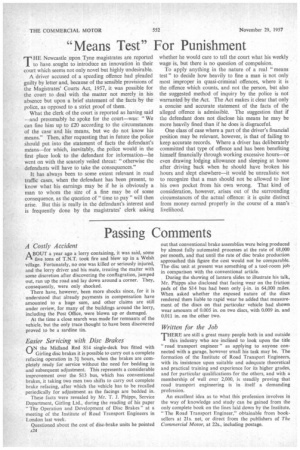"Means Test" For Punishment
Page 26

If you've noticed an error in this article please click here to report it so we can fix it.
THE Newcastle upon Tyne magistrates are reported to have sought to introduce an innovation in their court which seems not only novel but highly undesirable.
A driver accused of a speeding offence had pleaded guilty by letter and, because of the sensible provisions of the Magistrates' Courts Act, 1957, it was possible for the court to deal with the matter not merely in his absence but upon a brief statement of the facts by the police, as opposed to a strict proof of them.
What the clerk of the court is reported as having said —and presumably he spoke for the court—was: "We can fine him up to £20 according to the circumstances of the case and his means, but we do not know his means." Then, after requesting that in future the police should put into the statement of facts the defendant's means—for which, inevitably, the police would in the first place look to the defendant for information—he went on with the scarcely veiled threat: "otherwise the defendants will have to take the consequences."
It has always been to some extent relevant in road traffic cases, when the defendant has been present, to know what his earnings may be if he is obviously a man to whom the size of a fine may be of some consequence, as the question of "time to pay" will then arise. But this is really in the defendant's interest and is frequently done by the magistrates' clerk asking whether he would care to tell the court what his weekly wage is, but there is no question of compulsion.
To apply anything in the nature of a real "means test" to decide how heavily to fine a man is not only most improper in quasi-criminal offences, where it is the offence which counts, and not the person, but also the suggested method of inquiry by the police is not warranted by the Act. The Act makes it clear that only a concise and accurate statement of the facts of the alleged offence is admissible. The suggestion that if the defendant does not disclose his means he may be more heavily fined than if he does is disgraceful.
One class of case where a part of the driver's financial position may be relevant, however, is that of failing to keep accurate records. Where a driver has deliberately committed that type of offence and has been benefiting himself financially through working excessive hours—or even drawing lodging allowance and sleeping at home after driving back when he should have broken his hours and slept elsewhere—it would be unrealistic not to recognize that a man should not be allowed to line his own pocket from his own wrong. That kind of consideration, however, arises out of the surrounding circumstances of the actual offence: it is quite distinct from money earned properly in the course of a man's livelihood.




























































































